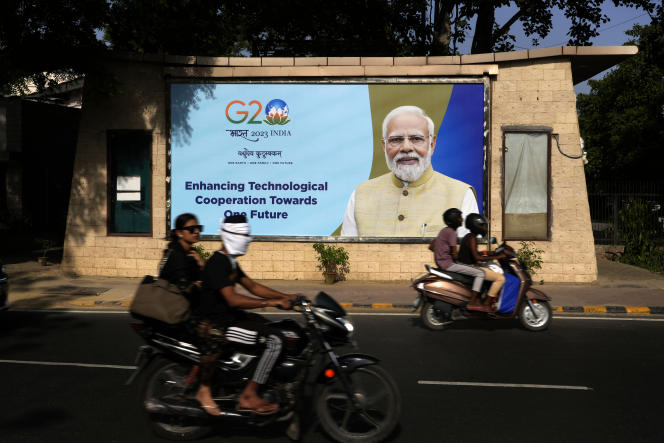His image is everywhere. Hundreds of billboards installed along the roads of Delhi, in airports, train stations, near administrations and even in gas stations praise the action of Narendra Modi and the G20, through various slogans and varied. The Indian Prime Minister, as is often the case, has excessively personalized an event that is quite banal, the rotating presidency of the group of the richest countries on the planet, the climax of which is expected on September 9 and 10, with the summit of heads of state organized in New Delhi.
The Indian press, the vast majority of which is in favor of power, has been talking for months about this meeting, used by Modi as a tool for personal promotion and an instrument of propaganda. Even the G20 logo, inspired by the lotus, the sacred flower of Hinduism, which is the symbol of the Bharatiya Janata Party (BJP), the political party of the head of government, maintains the confusion between foreign policy and partisan affairs. The maneuver is so crude that former Prime Minister Manmohan Singh, from the ranks of the (opposition) Congress and an authority figure, called on him to “exercise restraint in using diplomacy and foreign policy for political and personal purposes”.
This summit ends a year of intense diplomatic activity for New Delhi. In addition to the G20, India chaired the Shanghai Cooperation Organization, a regional alliance in the orbit of China and Russia. In January, she organized a forum called the Voice of the Global South to speak for developing countries and she participated in the G7 in Hiroshima in May, at the invitation of Japanese Prime Minister Fumio Kishida. At the same time, the Indian Prime Minister has increased his trips abroad and official visits to Sydney, Paris, Washington, Cairo, Abu Dhabi and Athens. Everywhere, he was received in majesty, despite his authoritarian drift, despite his regime’s attacks on civil and political freedoms, and the violence against religious minorities and Dalits, the former untouchables. His hosts are not unaware of this.
This diplomatic frenzy is not devoid of political ulterior motives. The Indian Prime Minister has already entered the election campaign. He is betting internationally to win a third mandate during the general elections scheduled for the first half of 2024. The G20 leaders made his task easier by agreeing to reverse the order of presidencies. New Delhi should normally have chaired the G20 in 2022, instead of Indonesia. Modi hopes to take advantage of this emphasis on India at the polls, by showing voters that he has given the South Asian giant the place of a major country on the world stage.
You have 67.29% of this article left to read. The rest is reserved for subscribers.
